▼音声で学びたい方はこちらへ🐻
現在撮影中
▼CROWN2-高2《Lesson4》はこちらから🐻
- 授業前にひとこと
- 勉強のポイント
- 本文&和訳
- 重要単語
- 重要ポイント
- 【1】At Madhu there were 28,000 refugees, and yet there was only one small hospital, where we had only two nurses, two Tamil doctors, interpreters, and health workers.
- 【2】We had only the simplest medical equipment to work with.
- 【3】There were times when we felt sad because we had to treat so many patients with old equipment.
- 【4】We started at 9 a.m. and treated about 150 people each day.
- 【5】They spoke Tamil.
- 【6】We asked them simple questions and decided what to do.
- 【7】In the afternoon, we treated people in our eight beds, usually pregnant women and babies.
- 【8】Sometimes we went to a small camp eight kilometers away from Madhu.
- 【9】We worked from morning till night.
- 【10】Malaria, asthma, pneumonia-these diseases were the most common.
- 【11】Poor food and water were also serious problems.
- 【12】When the rainy season came in October, diarrhea increased and we lost some of our children.
- 【13】We treated everyone who came to us, even soldiers carrying weapons, but only after they put their weapons away.
- 【14】We were told we would be safe.
- 【15】However, there were times when we were ordered not to go out at night.
- 【16】We listened to the radio to find out whether it was safe to go outside or not.
授業前にひとこと
今回は、CROWN2-高2《Lesson4》について扱っていきます❗️
Lesson4のタイトルは…🐻
Crossing the Border
という「貫戸朋子医師の国境なき医師団でのストーリー」です。
ちなみに、このLessonでメインで使われている文法事項は…
関係副詞の非制限用法 / 不定詞 + 前置詞
です❗️
ちなみに、この記事では…
CROWN
の本文を引用しています。
すでに上記の教科書をお持ちの方向けの記事になりますので、お持ちでない方は全国の『教科書取扱書店』にて購入してから、記事を読み進めるようにお願いします!
さて、いつも授業前に説明することですが…
⇧に載せてあります『単語・和訳・英作文トレーニング』をテスト1週間前から毎日やってみてください❗️曖昧な理解がなくなり、成績が爆伸びします!!
コミュ英以外の定期テスト対策は?
現代文の定期テスト対策は こちら から
古文の定期テスト対策は こちら から
漢文の定期テスト対策は こちら から


個別指導塾 SECOND《定期テストコース》 をもっと活用する


公式LINEアカウント では…
▷ 解説記事のリクエスト
▷ 新着情報のキャッチ
▷ 定期テスト予想問題
▷ オリジナルグッズの購入
ができるようになっています🐻
個別指導塾 SECOND《定期テストコース》 の 公式LINEアカウント はこちら
勉強のポイント
①本文は『仕事のための最小限の医療設備しかない状況でどう仕事をするか』という話であることを理解する。
②単語・重要ポイントをインプットする。
③ 関係副詞の非制限用法 / 不定詞 + 前置詞 について理解する。
本文&和訳
本文(Scene2)
【2】At Madhu there were 28,000 refugees, and yet there was only one small hospital, where we had only two nurses, two Tamil doctors, interpreters, and health workers.
マドゥには2万8千人の難民がいましたが、小さな病院が1つしかなく、そこには看護師が2人、タミル人の医師が2人、通訳と保健スタッフがいるだけでした。
We had only the simplest medical equipment to work with.
私たちが使えるのは、最も簡単な医療器具だけでした。
There were times when we felt sad because we had to treat so many patients with old equipment.
古い機材で多くの患者を診なければならず、悲しい気持ちになることもありました。
We started at 9 a.m. and treated about 150 people each day.
私たちは午前9時に仕事を始め、毎日およそ150人を診ていました。
They spoke Tamil.
彼らはタミル語を話していました。
We asked them simple questions and decided what to do.
私たちは簡単な質問をして、どう対応するかを決めていました。
In the afternoon, we treated people in our eight beds, usually pregnant women and babies.
午後には、8つのベッドで主に妊婦や赤ちゃんを診ていました。
Sometimes we went to a small camp eight kilometers away from Madhu.
ときどき、マドゥから8キロ離れた小さなキャンプにも行きました。
We worked from morning till night.
私たちは朝から晩まで働いていました。
Malaria, asthma, pneumonia-these diseases were the most common.
マラリア、ぜんそく、肺炎――これらの病気が最も多く見られました。
Poor food and water were also serious problems.
劣悪な食事と水も深刻な問題でした。
When the rainy season came in October, diarrhea increased and we lost some of our children.
10月に雨季が来ると下痢が増え、子どもたちの何人かを失いました。
We treated everyone who came to us, even soldiers carrying weapons, but only after they put their weapons away.
私たちは武器を持った兵士も含め、訪れたすべての人を治療しましたが、それは彼らが武器をしまってからのことでした。
We were told we would be safe.
私たちは安全だと聞かされていました。
However, there were times when we were ordered not to go out at night.
しかし、夜は外出しないよう命じられることもありました。
We listened to the radio to find out whether it was safe to go outside or not.
外に出ても安全かどうかを知るために、ラジオを聞いていました。
重要単語


単語にはさまざまな意味がありますが、まずは定期テストを乗り越えるために、文章中で使われている意味で紹介しています🐻
V : 動詞 , Ving : 動名詞 , Vpp : 過去分詞, O:目的語, C:補語
| 英語表現 | 品詞・構文区分 | 意味・解説 |
|---|---|---|
| refugee | 名詞 | 難民 |
| equipment | 名詞 | 機器、設備(不可算名詞) |
| treat (a patient) | 動詞 | (患者を)治療する |
| pregnant | 形容詞 | 妊娠している |
| from morning till night | 熟語 | 朝から晩まで(期間・時間の表現) |
| common diseases | 形容詞+名詞 | よくある病気、一般的な病気 |
| poor food and water | 名詞句 | 質の悪い食事と水(”poor” は質の低さを示す) |
| rainy season | 名詞句 | 雨季 |
| lose + 人(lose some children) | 動詞+目的語 | ~を失う(亡くなるという意味含む) |
| even soldiers carrying weapons | 副詞+名詞句 | 武器を持った兵士さえも(”even” の強調) |
| only after S+V | 接続構文 | ~して初めて(”only” を副詞的に用いた時間・条件の強調構文) |
| be told that S+V | 受動態構文 | ~だと告げられる(tell 人 that ~ の受動態) |
| be ordered not to V | 受動態構文 | ~しないように命じられる |
| find out whether S+V | 動詞句+名詞節 | ~かどうかを調べる(”whether” を使った名詞節) |
| ask A (人) B (こと) | 動詞構文 | AにBを尋ねる(第4文型/ask 人 事) |
重要ポイント
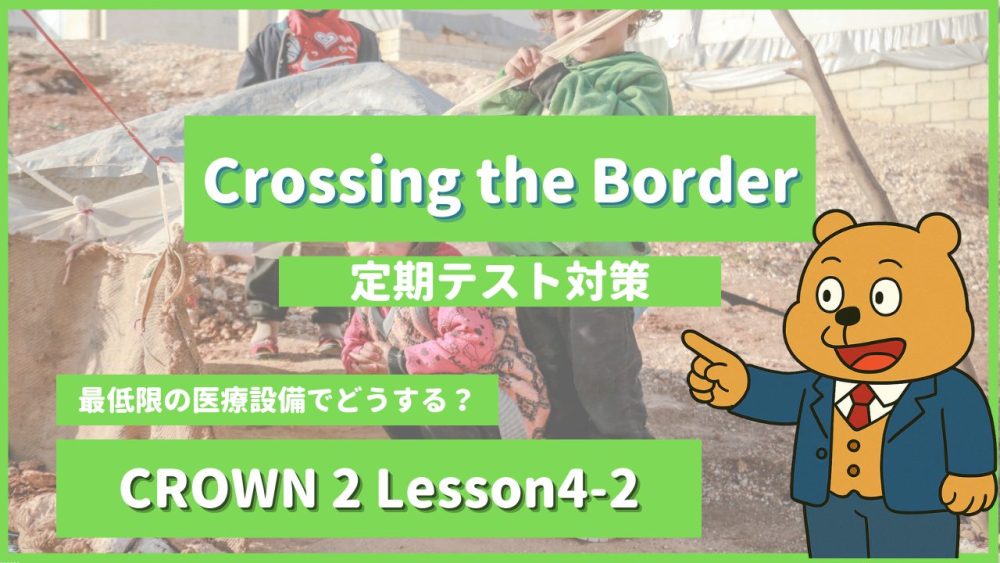

「ピンク」=重要ポイント
▼記号について
V : 動詞 Ving : 動名詞 Vpp : 過去分詞
【 】名詞句・節 〈 〉形容詞句・節 ( )副詞句・節
S:主語 O:目的語 C:補語 M:副詞
【1】At Madhu there were 28,000 refugees, and yet there was only one small hospital, where we had only two nurses, two Tamil doctors, interpreters, and health workers.
《和訳》
マドゥには2万8千人の難民がいましたが、小さな病院が1つしかなく、そこには看護師が2人、タミル人の医師が2人、通訳と保健スタッフがいるだけでした。
《重要ポイント》


この文では…
① 倒置構文(There were ~)
② 逆接表現 “and yet”
③ 関係副詞 “where” の非制限用法と which との違い
が学べます!
受験に向けてもしっかり学ぼう🐻
ポイント①:倒置構文(There were ~)
・“There were” は「~がいた/あった」という存在の構文
・主語(28,000 refugees)は動詞の後ろに置かれている
・場所を示す語句 “At Madhu” が文頭にくることで倒置っぽく見えるが、英語では自然な語順
ポイント②:逆接表現 “and yet”
・“and yet” は「それにもかかわらず」という逆接の接続句(“and”+副詞“yet”)
・「多くの難民がいたのに、病院はたった1つだけ」という強い対比を表す
・意味としては “nevertheless” や “however” に近いが、文法的には等位接続詞句
ポイント③:関係副詞 “where” の非制限用法と which との違い
・“where” は場所(hospital)を先行詞にとり、「そこで~する」と説明する関係副詞
・この文では非制限用法(カンマあり)で補足情報を加えている
・“where we had ~” は主語と動詞がそろった完全文なので関係副詞が使える
・“which” を使うなら「the hospital in which we had ~」とする必要がある
・後ろの文が完全文→関係副詞 where、後ろが不完全文→関係代名詞 which


問題で復習しよう🐻
| 【解答】1 |
| 【解説】“There were ~” は存在を表す構文で、「~がいた/あった」という意味。 |
| 【解答】3 |
| 【解説】“and yet” は「それにもかかわらず」という意味で、“nevertheless” が最も近い。 ただし、“and yet” は接続詞句、“nevertheless” は副詞であり、文法的には置き換えできない。 |
| 【解答】2 |
| 【解説】“we had ~” は主語と動詞がある完全文なので、場所を表す先行詞 “hospital” を受けるには関係副詞 “where” を使うのが適切。カンマがあるので非制限用法となる。 |
【2】We had only the simplest medical equipment to work with.
《和訳》
私たちが使えるのは、最も簡単な医療器具だけでした。
《重要ポイント》


この文では…
① 限定詞 only の強調構文
② 形容詞の最上級 “the simplest” の使い方
③ 不定詞の形容詞的用法 “to work with”
が学べます!
受験に向けてもしっかり学ぼう🐻
ポイント①:限定詞 only の強調構文
・“only” は「~しかない」「たった~」という限定の意味
・名詞句 “the simplest medical equipment” を強調し、「それしかなかった」と伝えている
・強調したい語句の直前に置いて限定する
ポイント②:形容詞の最上級 “the simplest” の使い方
・“simple(簡単な)” の最上級形は “simplest”
・“the + 最上級 + 名詞” で「最も~な〇〇」
・この文では「最も簡易な医療器具」という意味
ポイント③:不定詞の形容詞的用法 “to work with”
・“to work with” は前の名詞(equipment)を説明する形容詞的用法の不定詞
・直訳すると「一緒に作業するための機器」=「使うための機器」
・前置詞 “with” がついているため、「一緒に使って働く」というニュアンスを強調


問題で復習しよう🐻
| 【解答】3 |
| 【解説】“only” は「~しかない」、最上級 “the simplest” は「最も簡単な」という意味。 |
| 【解答】This is the simplest solution to the problem. |
| 【解説】“the simplest + 名詞” の形で「最も簡単な~」。 “solution to the problem” は「問題に対する解決策」。 |
| 【解答】3 |
| 【解説】“to work with” は前の名詞 “equipment” を説明する不定詞で、形容詞的用法。 |
ここまで執筆完了❗️リクエストがあれば解説を加えていきます!


すぐに解説記事を見たい方は、こちらのLINEからリクエストを送ってくださいね🐻
個別指導塾 SECOND《定期テストコース》 の 公式LINEアカウント はこちら
【3】There were times when we felt sad because we had to treat so many patients with old equipment.
《和訳》
古い機材で多くの患者を診なければならず、悲しい気持ちになることもありました。
《重要ポイント》
【4】We started at 9 a.m. and treated about 150 people each day.
《和訳》
私たちは午前9時に仕事を始め、毎日およそ150人を診ていました。
《重要ポイント》
【5】They spoke Tamil.
《和訳》
彼らはタミル語を話していました。
《重要ポイント》
ここは特になし!
【6】We asked them simple questions and decided what to do.
《和訳》
私たちは簡単な質問をして、どう対応するかを決めていました。
《重要ポイント》
【7】In the afternoon, we treated people in our eight beds, usually pregnant women and babies.
《和訳》
午後には、8つのベッドで主に妊婦や赤ちゃんを診ていました。
《重要ポイント》
【8】Sometimes we went to a small camp eight kilometers away from Madhu.
《和訳》
ときどき、マドゥから8キロ離れた小さなキャンプにも行きました。
《重要ポイント》
【9】We worked from morning till night.
《和訳》
私たちは朝から晩まで働いていました。
《重要ポイント》
【10】Malaria, asthma, pneumonia-these diseases were the most common.
《和訳》
マラリア、ぜんそく、肺炎――これらの病気が最も多く見られました。
《重要ポイント》
【11】Poor food and water were also serious problems.
《和訳》
劣悪な食事と水も深刻な問題でした。
《重要ポイント》
【12】When the rainy season came in October, diarrhea increased and we lost some of our children.
《和訳》
10月に雨季が来ると下痢が増え、子どもたちの何人かを失いました。
《重要ポイント》
【13】We treated everyone who came to us, even soldiers carrying weapons, but only after they put their weapons away.
《和訳》
私たちは武器を持った兵士も含め、訪れたすべての人を治療しましたが、それは彼らが武器をしまってからのことでした。
《重要ポイント》
【14】We were told we would be safe.
《和訳》
私たちは安全だと聞かされていました。
《重要ポイント》
【15】However, there were times when we were ordered not to go out at night.
《和訳》
しかし、夜は外出しないよう命じられることもありました。
《重要ポイント》
【16】We listened to the radio to find out whether it was safe to go outside or not.
《和訳》
外に出ても安全かどうかを知るために、ラジオを聞いていました。
《重要ポイント》


これで全て終了です❗️
「CROWN2-高2《Lesson4-2 | Crossing the Border 》」おつかれさまでした🐻
関係副詞の非制限用法 / 不定詞 + 前置詞 を踏まえて読解すれば、比較的話しの流れは掴みやすいですが、それが出来ていないと苦戦している文章もあったのではないでしょうか❗️
理解出来ている人も、油断せずに復習&音読するのをお忘れなく!!
①授業前にひとこと、でも話しましたが…
⇧に載せてあります『単語・和訳・英作文トレーニング』をテスト1週間前から毎日やってみてください❗️曖昧な理解がなくなり、成績が爆伸びします!!
最後まで見てくださってありがとうございました!
またお会いしましょう!定期テストがんばれ〜🐻
じゃあね〜、バイバイ!!
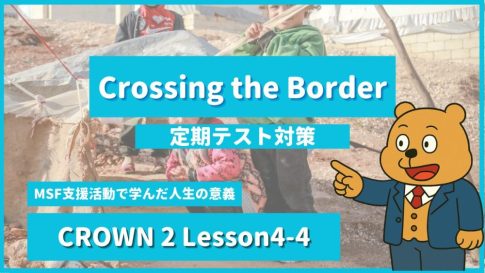
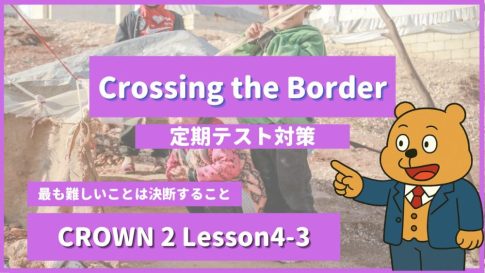
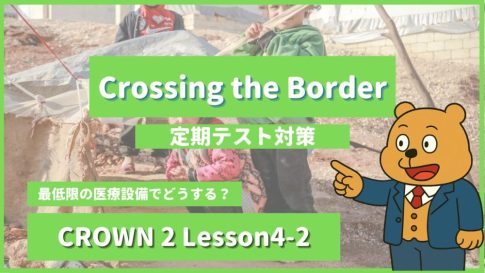
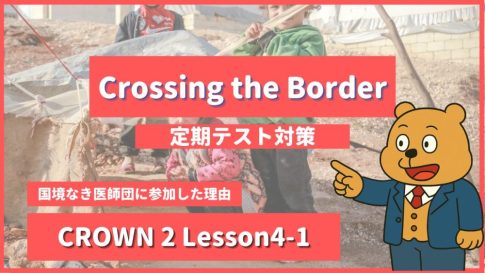
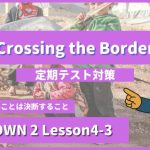
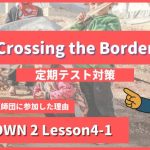
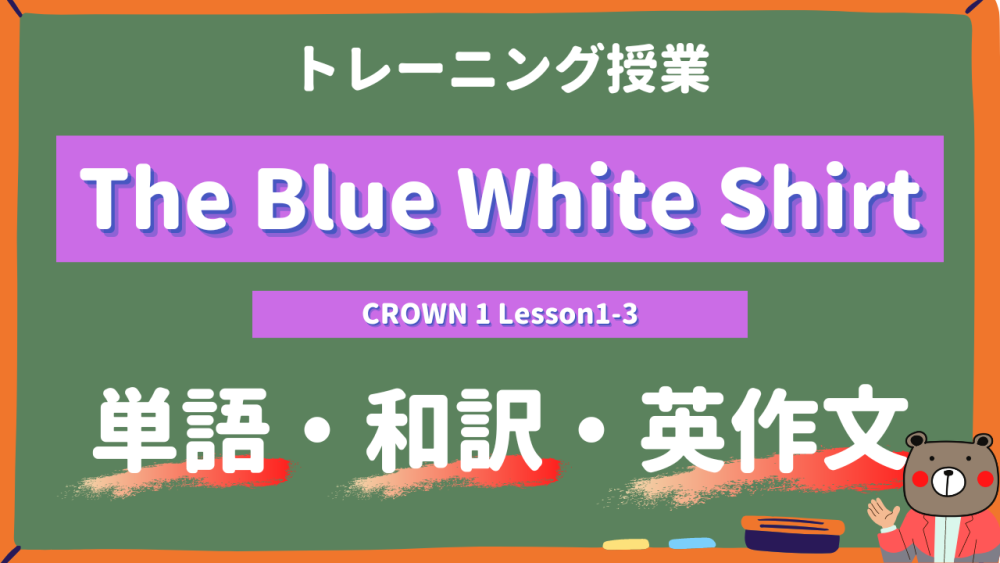

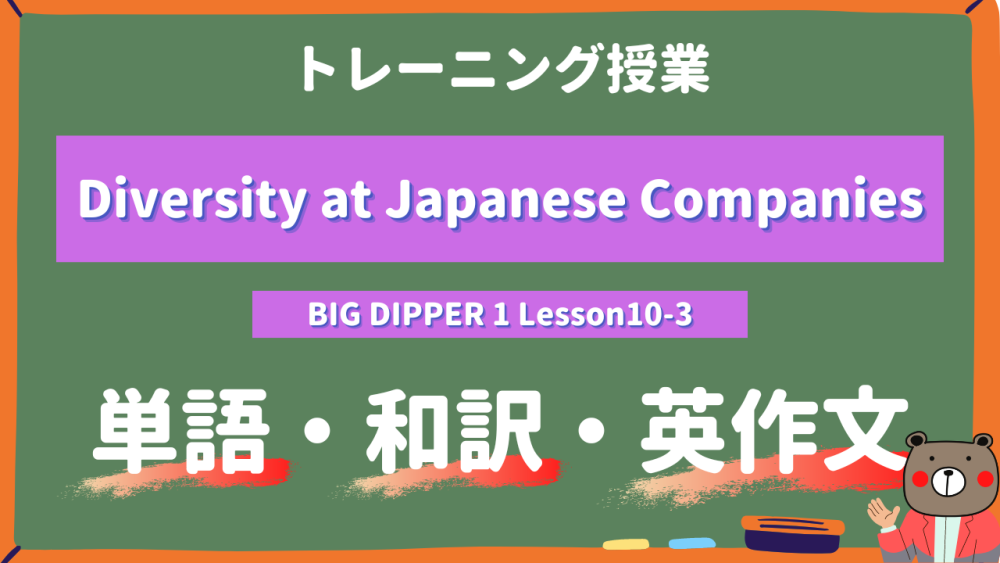
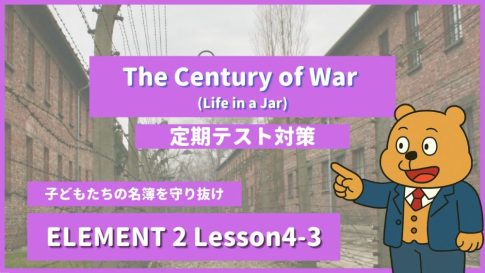

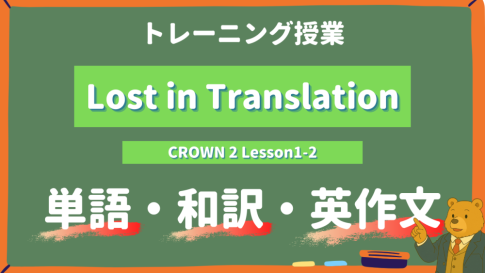
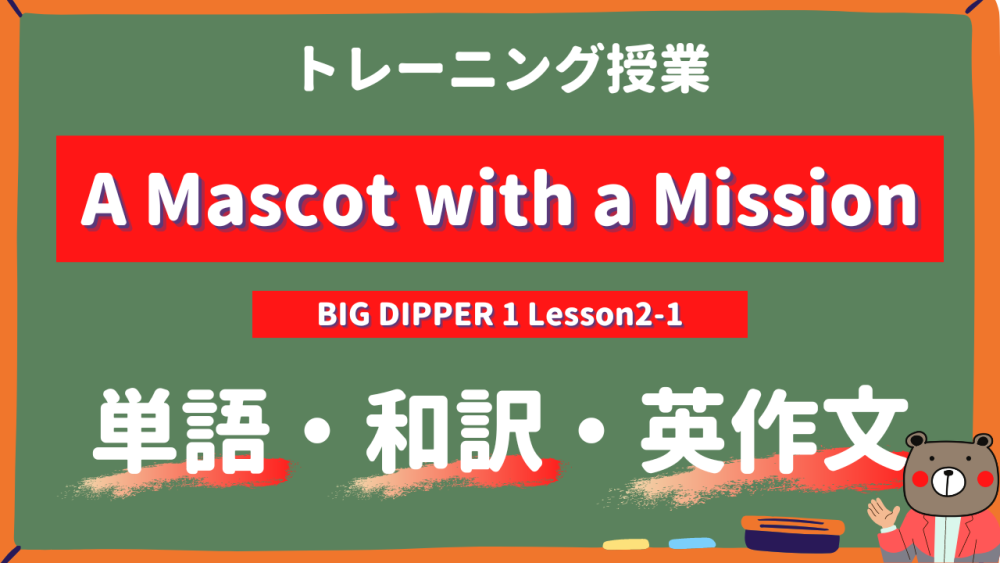

おすすめ勉強法は、テキストを見ながら、こちらの音声で学ぶと、目(視覚)も耳(聴覚)も両方使えるので、効果バツグンです🐻